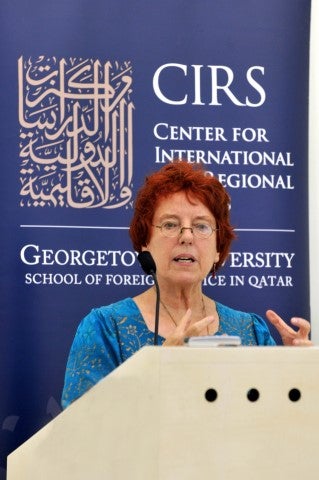Dialogue Series, Race & Society, Regional Studies
Mary Ann Tetreault on Education in the Gulf

Mary Ann Tétreault, the 2010-2011 CIRS Visiting Scholar and the Una Chapman Cox Distinguished Professor of International Affairs at Trinity University in San Antonio, was invited to deliver the October CIRS Monthly Dialogue lecture on the subject “Who Am I? International Education and Identity in the Gulf.”
The lecture was based on the phenomenon of transplanting foreign universities – particularly from the United States – into the Gulf. Tétreault pointed out that there were two interesting aspects to the American education model that has been established in many Gulf states. The first aspect is that “the model that is being transplanted to the Gulf is a model that Americans seem to have backed off from – it’s too expensive.” In America, high quality education is not something that is provided for all; many connect higher education solely to jobs rather than to human development, and see higher education as wasteful as job prospects for graduates decline while salaries and benefits shrink. The second aspect revolves around the question of compatibility. Tétreault asked: “How compatible are the values of American education with societies in the Gulf? And how can we get some compatibility between what is a questioning and interrogating educational philosophy and one where people memorize, accept, and have a much stricter view.”
During her research, Tétreault argued that she first had to gauge people’s expectations of universities and educational systems. Students attend university for a variety of different academic and social reasons; university faculty have certain expectations of their students; and the public too is an important stakeholder. Traditionally, “universities are funded by taxpayers and by the public in general and so the public has expectations too – what are these kids learning? Are they going to be able to graduate and go out and get jobs? Will they contribute to the growth of our society?”
Tétreault’s research focused on the American University of Kuwait (AUK), where she taught and conducted focus groups and interviews with students, faculty, and administrators for four months in spring 2010. Using AUK as her case study, the main research question that structured her project was “What is the contribution of these American universities to education in the Gulf?” At AUK, Tétreault observed that there was a great deal of negotiation that took place between the American values of the university and the Kuwaiti cultural mores that existed in the broader society. She noted that there was a significant amount of friction between these two ideals. Other contentious issues between American and Kuwaiti values center on questions of censorship; gender; and academic freedom and autonomy.
Tétreault concluded by saying that there are serious compatibility issues between the effects of an American-style education and the Gulf society it is being transplanted into. Long-term issues such as the question of academic freedom, censorship, and the role of women in society are just some of the cultural clashes that are occurring and may have long-term effects in the future. In her findings, Tétreault did, however, observe that AUK does display many features of American education that are valuable to students and the larger community. For example, faculty devotes a significant amount of time to students, and there is a great deal of attention paid to student development. Tétreault concluded that the students who go to AUK do internalize American values: “they think they should be independent, they think they should be autonomous, and they think they should be able to go out into the economy” and find opportunities as Kuwaitis who are both American-trained and compatible with their own society.
Mary Ann Tétreault’s publications include books and articles about democratization, social movements, gender, oil markets, war crimes, international political economy, world politics, and American foreign policy. Her regional focus is the Gulf, with an emphasis on Kuwait about which she has written many articles and two books, The Kuwait Petroleum Corporation and the Economics of the New World Order and Stories of Democracy: Politics and Society in Contemporary Kuwait. Her forthcoming co-edited book, Political Change in the Arab Gulf States: Stuck in Transition, is scheduled to be published in December.
Article by Suzi Mirgani, Publications Coordinator